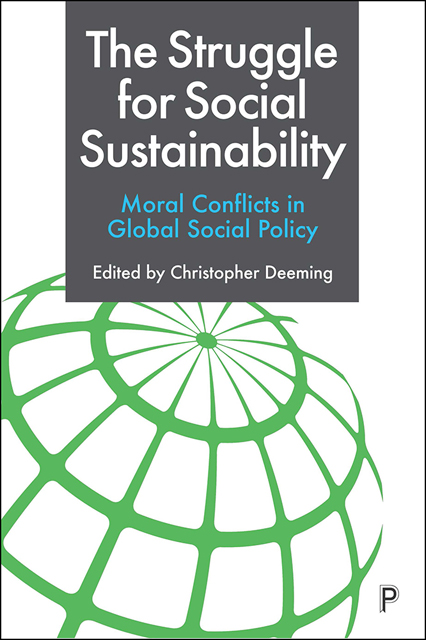Book contents
- Frontmatter
- Contents
- List of boxes, figures and tables
- List of abbreviations
- Notes on contributors
- Acknowledgements
- Preface
- 1 The ‘social’ in the age of sustainability
- 2 ‘No such thing as society’? Neoliberalism and the social
- 3 The social question: reconciling social and economic imperatives in policy
- 4 Disputing the economization and the de- politicization of ‘social’ investment in global social policy
- 5 The social dimension of sustainable development at the UN: from Brundtland to the SDGs
- 6 Paradigm lost? Blocking the path to ecosocial welfare and post- productivism
- 7 World population prospects at the UN: our numbers are not our problem?
- 8 Ageing sustainably
- 9 The political challenges to governing global migration and social welfare
- 10 Bringing in ‘the social’: an intersectional analysis of global crises and welfare
- 11 Global social policy and the quasi- concept of social cohesion
- 12 Putting the global in social justice?
- 13 ‘Go- social’? Inclusive growth and global social governance
- 14 For better or worse?
- 15 The struggle for social sustainability
- Index
8 - Ageing sustainably
Published online by Cambridge University Press: 14 April 2023
- Frontmatter
- Contents
- List of boxes, figures and tables
- List of abbreviations
- Notes on contributors
- Acknowledgements
- Preface
- 1 The ‘social’ in the age of sustainability
- 2 ‘No such thing as society’? Neoliberalism and the social
- 3 The social question: reconciling social and economic imperatives in policy
- 4 Disputing the economization and the de- politicization of ‘social’ investment in global social policy
- 5 The social dimension of sustainable development at the UN: from Brundtland to the SDGs
- 6 Paradigm lost? Blocking the path to ecosocial welfare and post- productivism
- 7 World population prospects at the UN: our numbers are not our problem?
- 8 Ageing sustainably
- 9 The political challenges to governing global migration and social welfare
- 10 Bringing in ‘the social’: an intersectional analysis of global crises and welfare
- 11 Global social policy and the quasi- concept of social cohesion
- 12 Putting the global in social justice?
- 13 ‘Go- social’? Inclusive growth and global social governance
- 14 For better or worse?
- 15 The struggle for social sustainability
- Index
Summary
Introduction
Global ageing is a 21st century phenomenon and has far-reaching consequences for societies, communities, families and individuals, although it is only the economic ones that have dominated both national and global social policy discourses. In the more developed world, the debate about the impact of population ageing began in earnest in the 1980s. As the demographic transformation has reached the less developed world the debate has become global, although the pace of this change in the latter is much more rapid than in the former, which adds urgency to the policy discussions.
This chapter examines the implications of the major demographic shift in population age structures, Global North and South, and suggests how it might be managed sustainably. There are three stages to this analysis. First, the scope of global ageing is summarized, as well as its causes and the closely related transformations in family structure and epidemiology. Second, the relationship between ageing and sustainability discourses is examined, which reveals the heavy emphasis on the economic dimension, with the exclusion of the environmental and social ones. Third, a strategy is advanced to manage ageing sustainably at macro, meso and micro levels. But this would require concerted collective action of a kind that, until the COVID-19 pandemic, had fallen out of favour politically in many parts of the world.
Global ageing
Population ageing is the process by which older people, usually designated as those over the age of 60 or 65, become a larger proportion of the total population. This demographic transition was one of the defining features of the last century and will continue to exert far-reaching influence in the early stages of the present one. Underlying global population ageing are two major demographic changes. On the one hand, fertility rates have declined while, on the other, life expectancy has increased. (This leaves international migration as the only other demographic variable that might influence age distributions but, so far on this score, its overall role has been small.)
Fertility decline has been the primary determinant of population ageing. Between 1950 and 2000 the total fertility almost halved, from 5.0 children per woman of childbearing age to 2.7. It is projected to continue to fall over the next 50 years to below the replacement rate of 2.1 children (see Chapter 7).
- Type
- Chapter
- Information
- The Struggle for Social SustainabilityMoral Conflicts in Global Social Policy, pp. 155 - 176Publisher: Bristol University PressPrint publication year: 2021



